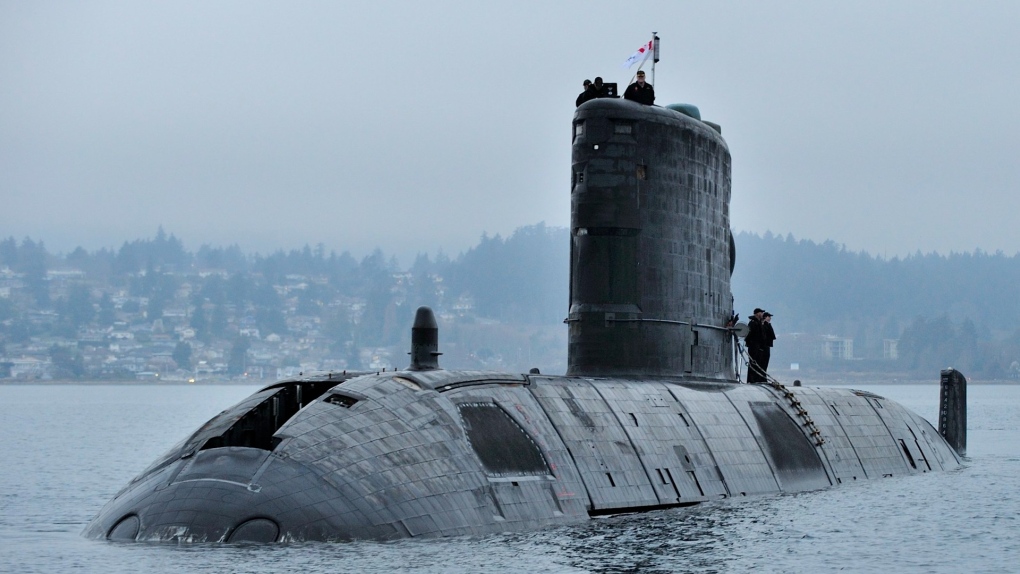
Canada seeking new torpedo countermeasures for military submarines
 Her Majesty’s Canadian Ship (HMCS) Victoria returns home to Esquimalt, B.C., from operations with the United States Navy on February 26, 2015. (LS Zachariah Stopa/MARPAC Imaging Services)
Her Majesty’s Canadian Ship (HMCS) Victoria returns home to Esquimalt, B.C., from operations with the United States Navy on February 26, 2015. (LS Zachariah Stopa/MARPAC Imaging Services)
The Canadian navy is on the hunt for a new system to defeat hostile torpedoes as it works to extend the life of its four Victoria-class submarines through the mid-2030s.
In documents published last week, the Department of National Defence and Procurement Canada say advances in sonar technology and torpedo guidance systems have made anti-submarine torpedoes more effective than ever at overcoming decoys and other countermeasures.
Canada's military submarines currently use small, three-inch beacons that have to be manually loaded and launched from either end of the boat to counter a torpedo threat.
There are two types of beacons currently in use; one that creates enough electroacoustic noise to hide the submarine from sonar detection, and another that produces a flurry of false sonar targets in an attempt to exhaust a searching torpedo until it runs out of fuel.
The order to launch the decoys has to be given verbally from the sub's control room to the beacon operator, hindering the crew's ability to respond quickly.
"The lack of integration or remote-control functionality greatly reduces already limited reaction time, decreasing the prospect of surviving a torpedo attack," says Procurement Canada in its request for information from military suppliers.
The goal of the agency and the DND is to eventually provide Canada's four diesel-electric submarines with a launch system that is fitted to the submarine's external hull and can be triggered remotely, according to the request.
LONG-TERM MODERNIZATION PROJECT
Despite the current lack of integration and remote functionality, a National Defence spokesperson says the navy's existing anti-torpedo countermeasures "are adequate to fulfil today’s operational requirements."
"However, given the rapidly evolving technological landscape, an upgraded torpedo countermeasure launch capability project is being included as part of the broader Victoria-class modernization project," said spokesperson Andrew McKelvey.
The long-term submarine modernization project, valued at between $1 billion and $4.99 billion, is intended to extend the life of the submarines though the mid-2030s and is a cornerstone of Canada's defence policy.
The timeline for the torpedo countermeasure replacement project will be determined after the information-request period closes on Aug. 26, McKelvey said.
"Consulting industry early in the process helps establish contracts down the line with improved pricing structures, better definition of requirements, improved timelines and built-in consideration of procurement opportunities," the spokesperson said.
"It will also ensure that we receive the maximum number of bids that meet the necessary technical requirements."
Canada's military submarines are based at Canadian Forces Base Halifax and Canadian Forces Base Esquimalt. The subs can operate globally on deployments that typically last up to two months.
CTVNews.ca Top Stories

Amid concerns over 'collateral damage' Trudeau, Freeland defend capital gains tax change
Facing pushback from physicians and businesspeople over the coming increase to the capital gains inclusion rate, Prime Minister Justin Trudeau and his deputy Chrystia Freeland are standing by their plan to target Canada's highest earners.
Bodies found by U.S. authorities searching for missing B.C. kayakers
United States authorities who have been searching for a pair of missing kayakers from British Columbia since the weekend have recovered two bodies in the nearby San Juan Islands of Washington state.
Tom Mulcair: Park littered with trash after 'pilot project' is perfect symbol of Trudeau governance
Former NDP leader Tom Mulcair says that what's happening now in a trash-littered federal park in Quebec is a perfect metaphor for how the Trudeau government runs things.
'It's discriminatory': Individuals refused entry to Ontario legislature for wearing keffiyeh
Individuals being barred from entering Ontario’s legislature while wearing a keffiyeh say the garment is part of their cultural identity— and the only ones making it political are the politicians banning it.
Competition bureau finds 'substantial' anti-competitive effects with proposed Bunge-Viterra merger
The proposed merger of agricultural giants Viterra and Bunge is raising competition concerns from the federal government.
Douglas DC-4 plane with 2 people on board crashes into river outside Fairbanks, Alaska
A Douglas C-54 Skymaster airplane crashed into the Tanana River near Fairbanks on Tuesday, Alaska State Troopers said.
BREAKING Mounties will not be charged in shooting death of B.C. Indigenous man
Three Mounties in British Columbia will not face charges in the killing of a 38-year-old Indigenous man on Vancouver Island in 2021.
Canada's favourite sport to watch is hockey, survey shows
The 2024 Stanley Cup playoffs have already delivered a fever level of fan excitement in Canada.
'It's just so hard to let it go': Umar Zameer still haunted by death of Toronto police officer
“It's just so hard to let it go. I mean, everyone is telling me, ‘you have to move on,’ but I know someone is not here [anymore]. So I don't know how I will move on." That’s what Umar Zameer, the man recently acquitted in the death of a Toronto police officer, told CTV News Toronto in a sit-down interview on Tuesday.































